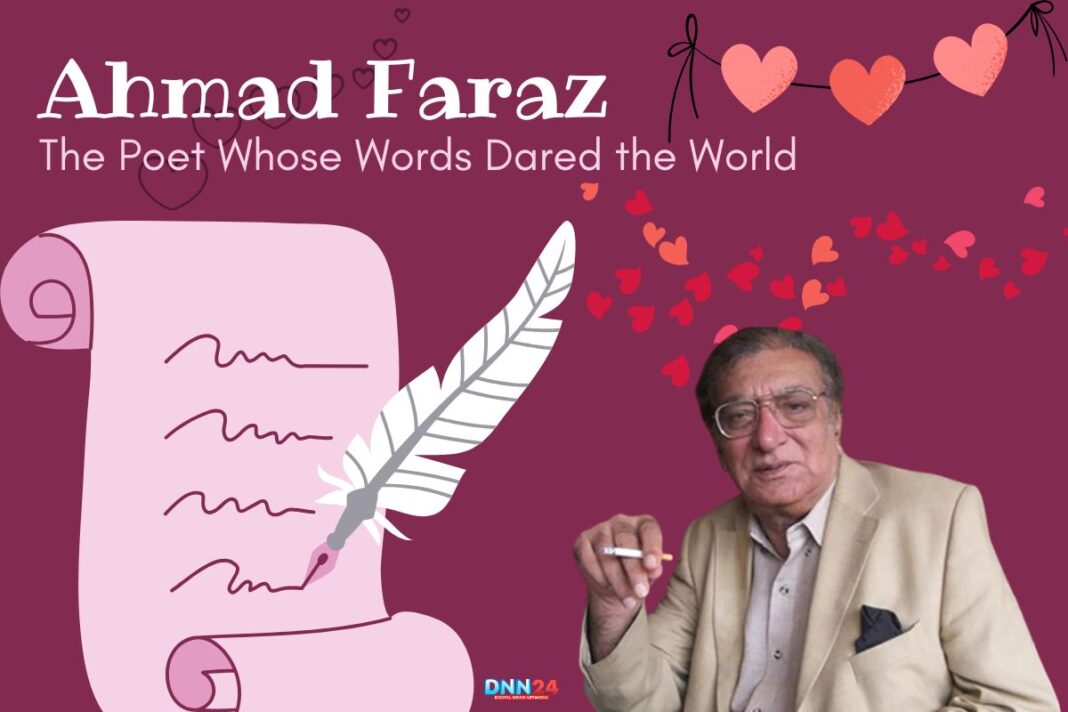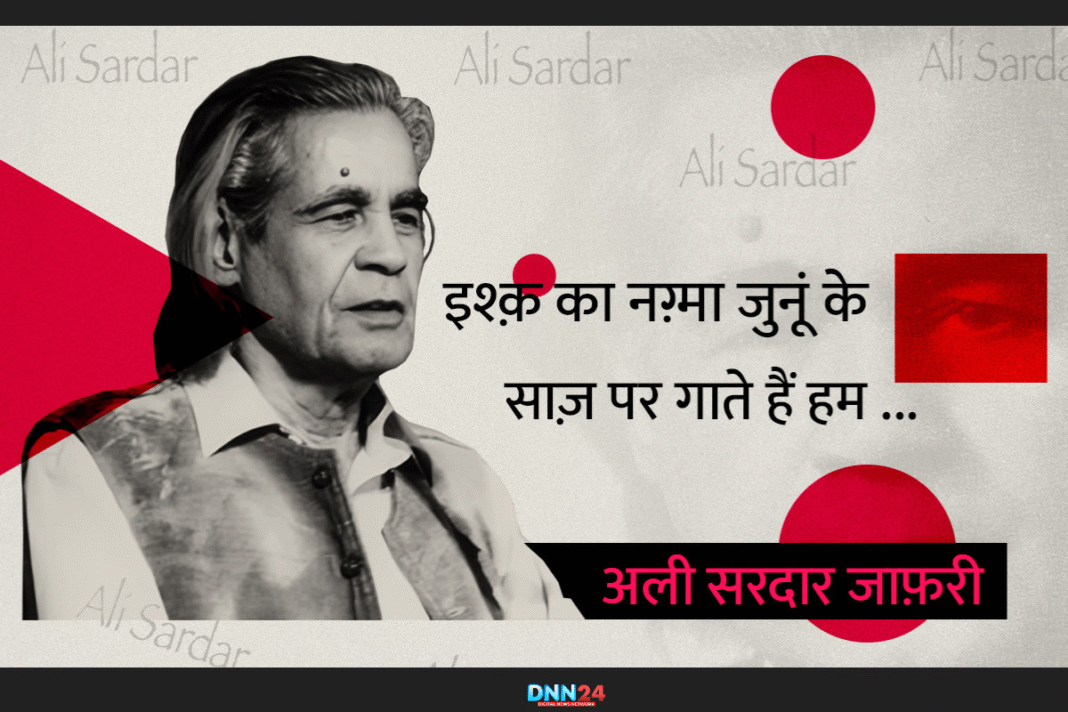Ahmad Faraz, born Syed Ahmad Shah in 1931 in Kohat, Pakistan, is a name that echoes in the corridors of Urdu poetry like a soft breeze carrying the fragrance of lost love and silent rebellion. As a child growing up under the mountainous terroir, he first discovered both the language of yearning and the melodies of speech. When his family went to Peshawar, Faraz pursued his studies at Edwards College and then got his Master’s degree in Urdu and Persian from Peshawar University. Being a Pashtun Syed by origin, the young Faraz soon held the position of lecturer at his old college, but his artistic desires took him elsewhere. His emotional pen traced the dreams and sadness of those who came before him. Beneath the bright gulmohar trees lining the alleys of Peshawar, he scribbled poems that gently touched people’s emotions. His poems weren’t simply poems; they were feelings that streamed from his youthful mountains to the cities loved by both lovers and revolutionaries.
He didn’t just write poetry—he was also looking for what was true in a loud world. His use of uncomplicated language, his exploration of deep pain, and the beauty he found in metaphor made him admired by people everywhere. Faraz exceeded the role of poet; he was a mild source of dissent, delivering hope to those who had lost love and strength to the oppressed.
“Ab ke hum bichhde to shayad kabhi khwabon mein milen
Ahmad Faraz
Jis tarah sukhe hue phool kitaabon mein milen”
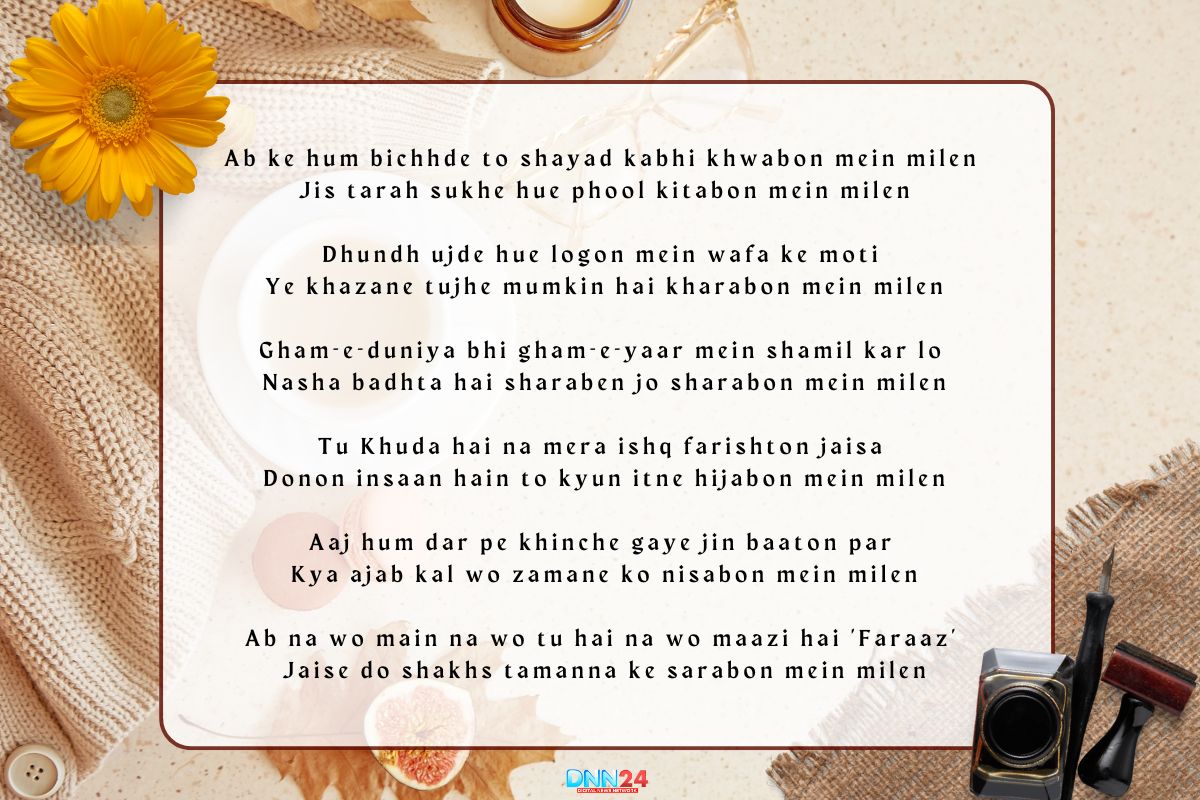
The Poet and the Prison: When Verses Became a Crime
The story of Ahmad Faraz is incomplete without the stormy night when poetry became a crime. His gentle protest poetry placed him in the sights of the regime during General Zia-ul-Haq’s rule in the 1980s. He was apprehended and imprisoned by the Pakistani military, a step that made him a literary legend. He was arrested merely for presenting a poem to a military officer, offering a printed version, and—so the authorities believed—trying to encourage dissent. The clash between poetry and state power took place in the Lahore High Court. He told the court that he needed to find a way to communicate his poetry. Because the court saw that his words were innocent and inspiring, it commanded his release, stating he fell outside the ambit of the Army Act. The affair is widely viewed as clear proof that poetry holds the power to unsettle tyrants and their regimes.
“Kis kis ko bataayen judai ka sabab hum
Ahmad Faraz
Tu mujh se khafa hai to zamaane ke liye aa”
This was not only the story of the poet imprisoned, but a story of the victory of poetry against oppression. Faraz’s exile that ensued – six years under the skies of Canada and Europe -became his most productive phase in life, and there, during his life, he has born masterpieces such as “Dekhtay Hain” and “Mohasara”. His words, formerly held captive, now flew over continents announcing the suffering of a hurting nation, the hope of a suffering nation.
The Unheard Stories: Life’s Hidden Tales and Shayari
Beneath the greatest poem is a subterfuge of stories that nobody ever gets to hear- tales of love that died, friendships destroyed, and times of silent rebellion. Ahmad Faraz’s life was full of such kissey, each one a petal in the garden of his poetry. One time, he fell in love with a girl when he was young, whose eyes were like the monsoon sky-deep and restless, full of longing. However, fate, acting as a playful poet, separated them. Faraz dedicated his heartbreak to verses that were the anthem of every lover who ever lost.
Ranjish hi sahi dil hi dukhane ke liye aa
Ahmad Faraz
Aa phir se mujhe chhod ke jaane ke liye aa
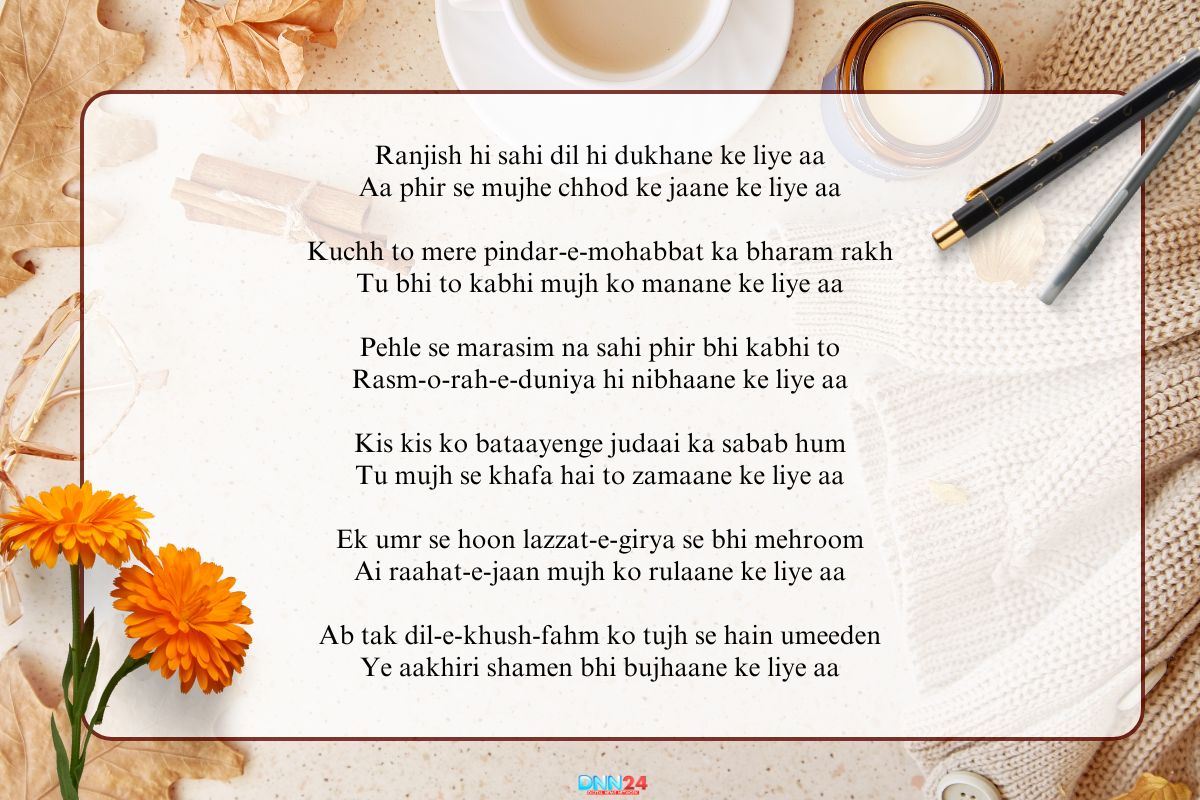
Another time, he was betrayed by a close friend, a wound that stung deeper than any political exile. In the quiet of the night, he wrote:
Tum takalluf ko bhi ikhlaas samajhte ho ‘Faraaz’
Ahmad Faraz
Dost hota nahin har haath milane wala
There was nothing grand about Faraz’s poetry. It was of little heartaches, unspoken tears, and laughter under the stars. He thought that poetry came out of troubles, but he grew up in love. His friends recall him as a man who could take the most ordinary moments—a cup of tea, a walk in the rain—and transform them into the couplet that took hours to forget long after the evening had become a memory.
The Magic of Faraz’s Nazm: Simple, Romantic, and Everlasting
Ahmad Faraz’s nazms are like a gentle rain on parched earth-each word a drop of longing, each line a river of emotion. His nazm is not poetry, but something more than poetry. It is the language of the heart, which was whispered and sighed. In his widely known nazm “Suna Hai Log Use Aankh Bhar Ke Dekhte Hain,” he entwines love with a sprinkle of oddness, infusing the scent of the unknown as if love were a city and each of its alleys conceals a secret.
Suna hai log use aankh bhar ke dekhte hain
Ahmad Faraz
So us ke shahr mein kuchh din thahar ke dekhte hain
Suna hai bole to baaton se phool jhadhte hain
Ye baat hai to chalo baat kar ke dekhte hain
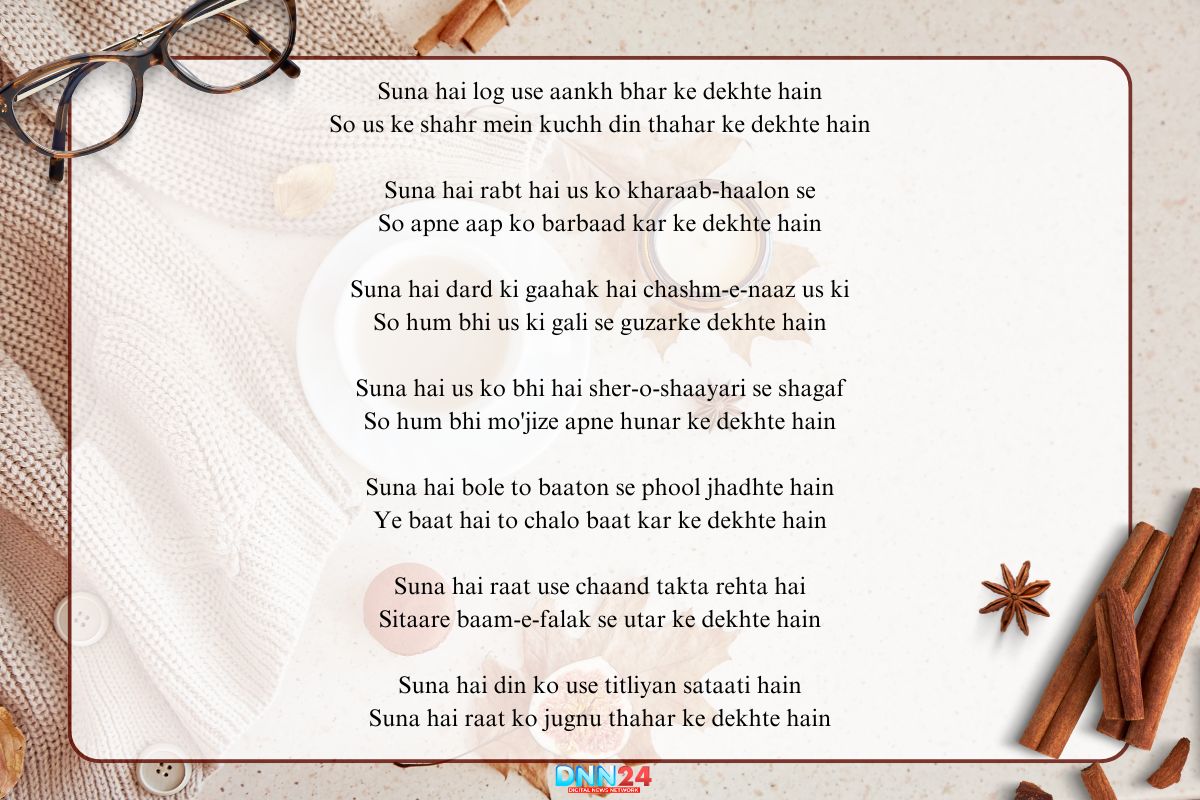
The Legacy of Ahmad Faraz: A Poet for All Seasons
Ahmad Faraz is more than a poet; he is a phenomenon. His poetry continues to inspire singers, writers, and dreamers across the world. With 13 volumes of poetry, countless awards, and a legacy that refuses to fade, Faraz remains the voice of those who dare to love and those who dare to resist. His words are taught in classrooms, sung at mushairas, and whispered in the silence of lonely nights.
Zindagi se yahi gila hai mujhe
Ahmad Faraz
Tu bahut der se mila hai mujhe
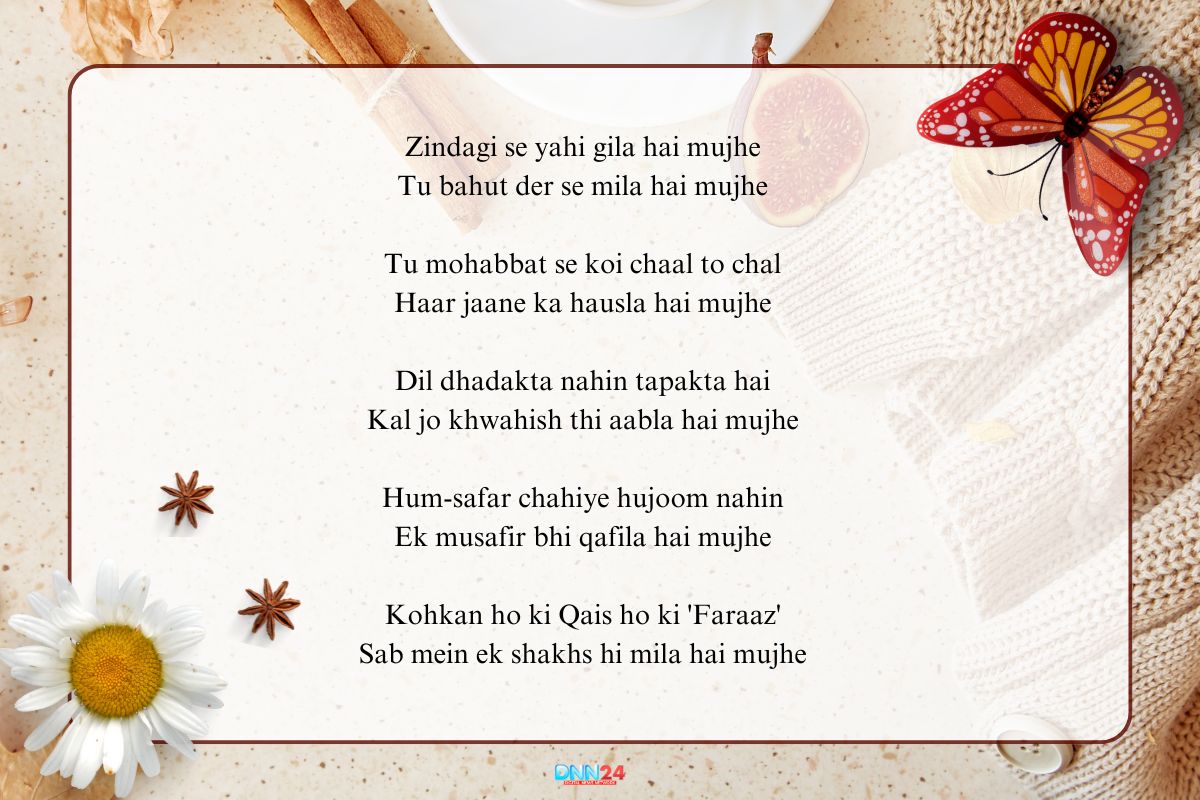
Ahmad Faraz’s Nazm: A Romantic Walk through His World
Let us wander through the garden of Faraz’s nazms, where every flower is a memory, and every thorn a lesson. His nazms are not just poems-they are conversations with the moon, confessions to the stars, and letters to lost lovers. In “Itna Sanata Ke Jaisay Ho Sakout Sehra,” he captures the silence of separation, the loneliness that echoes even in a crowded room.
Itna sannata ki jaise ho sukoot-e-sahra
Ahmad Faraz
Aisi taariki ki aankhon ne duhaai di hai
Jaane zindaan se udhar kaun se manzar honge
Mujh ko deewaar hi deewaar dikhai di hai
Door ik faakhta boli hai bahut door kahin
Pehli aawaaz mohabbat ki sunai di hai
Faraz’s romantic nazms are like a monsoon evening-full of longing, scented with nostalgia, and alive with hope. He writes of eyes that haunt, of voices that linger, and of moments that refuse to fade. His words are simple, yet they carry the weight of a thousand unsaid emotions. In “Dosti Ka Haath,” he celebrates friendship as a bond that survives even the harshest storms.
Dosti ka haath jab bhi barhaya
Ahmad Faraz
Toota hua dil le kar aaya
His nazms are not just about love-they are about life itself. The pain of exile, the joy of reunion, the sorrow of betrayal, and the hope of a new dawn-all find a place in his verses. Faraz’s nazms are a mirror in which every reader finds their own reflection, their own story.
Kis bojh se jism toot-ta hai
Ahmad Faraz
Woh kaise shobada-gar tha
In the end, Ahmad Faraz’s nazms are a promise-that as long as there are hearts that love, there will be poems that heal. His legacy is not just in the books he wrote, but in the lives he touched, the tears he dried, and the dreams he inspired.
Also Read: Faiz Ahmed Faiz: The Poet of Emotions, Humanity, and Love
You can connect with DNN24 on Facebook, Twitter, and Instagram and subscribe to our YouTube channel.

